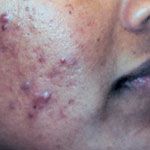
What is acne?
Acne is a skin condition that usually affects teenagers, but can continue into the 20s or later. It consists of mild to severe outbreaks of pimples and cysts – usually on the face, back, arms and/or chest.
Why does it happen in your teens?
It’s all about hormones. When you start puberty (becoming an adult), a lot of hormones are released into the body all at once. One of these hormones is androgen. Both boys and girls have androgen, but boys have more of it. Androgen affects oil glands in the skin of your face, neck, back, shoulders and chest. It makes the glands grow bigger and produce more oil.
Bacteria on your skin make this oil thicken, which blocks the pores. This ends up causing blackheads, pimples and cysts.
What can be done about it?
There are a whole host of treatments available for people suffering from acne. If you’re worried about your acne, the best thing to do is to speak to your doctor or chemist – don’t rely on advice from TV ads or friends. Your doctor or chemist may be able to recommend medicine that can help you.
You can also try doing the following:
- Keep it clean – wash the affected skin two or three times a day. But don’t over-wash, as this can cause dryness and other skin irritations.
- Try to keep your hair clear of your face and neck – the oil from your hair can make your acne worse.
- Choose oil-free products – use water-based make-up and oil free moisturisers.
- Don’t stress – stress can trigger an outbreak, because it can make your skin produce more oil.
- Eat well and drink water – a healthy diet can help keep your skin clearer, as can drinking plenty of water every day.
Most importantly – DON’T SQUEEZE ‘EM! Picking and squeezing pimples can make them worse, because it helps more germs get into your skin. It can also cause scarring.
Comments are closed.